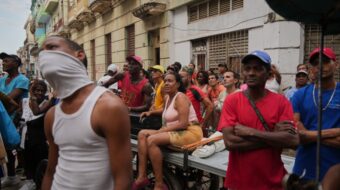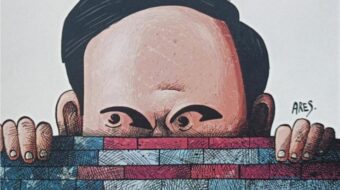The U.S. anti-Cuban blockade has lasted 52 years. Opponents judge it illegal, immoral, and/or cruel. Some regret missing out on business opportunities. U. S. opinion surveys show majority support, even among Cuban-Americans, for normal U.S. -Cuba relations. World opinion agrees. Annually for 20 years the United Nations General Assembly has overwhelmingly voted down the blockade.
Apologists dismiss arguments based on international law and fairness. In the U.S. Congress, the blockade is a fixture. According to the Helms Burton law of 1996, Congress retains sole authority for changing the policy in any basic way.
Yet it’s apparent now that U.S. implementation of anti-Cuba policies has rough edges. Funds dispersed for the purpose are not well monitored. Special privileges emerge. These areas relating to control over money may serve to persuade distracted elected officials to attend to U.S. – Cuba relations.
That happened in 2001 when the U.S. Congress, making an exception, granted permission for exporters to send food to Cuba. One-way trade increased to the point in 2008 of U.S. agri-business selling $710 million worth of food products to Cuba. Residual barriers have hampered exports since then, to the dismay of big farm interests.
By and large, legislators dealing with Cuba policies have done so under the aegis of an intransigent political constituency fighting old battles, one as powerful as it is small.
Dealing with taxpayers’ wasted money, however, congresspersons would be on their own. That’s currently suspected of U.S. operations against Cuba carrying “track two” designation. “Track two” referred to programs directed at undermining adversaries during the cold war. In 1962 State Department official Eugene Rostow established that track two for Cuba “would consist of an effort to engage Cubans more deeply, both within Cuba and abroad, in efforts of their own liberation.” The Helms Burton Law replenished track two funding
Journalist Terrie Eaton has studied such actions against Cuba implemented by the United States Agency for International Development (USAID). Now, 12 mostly Florida – based NGO’s hold USAID contracts worth $29.3 million. Older contracts awarded the groups totaled $24.3 million. Eaton cities six other NGO’s with past USAID contracts amounting to $31.7 million.
According to Eaton, “USAID does not make public detailed reports showing how it spends democracy funds… [L]ittle is ever known about whether the money reached Cuba.” He cites a 2008 report from the Cuban American National Foundation (CANF) calling for USAID transparency. CANF, a high profile Cuban government adversary, alleged USAID Cuba programs were “utterly ineffective due to restrictive institutional policies and a lack of oversight and accountability…less than 46% of total USAID-Cuba funds from 1998 to 2006″ helped build solidarity…”
USAID hired Development Alternatives Inc (DAI) in 2008 to supply Cuba’s political opposition with sophisticated communications equipment. Under its $28,310,630 contract DAI secured the services of Alan Gross. Gross’ 2009 arrest in Cuba led to the contract being cut to $6,857,817. Not only is USAID silent about use of that money, but also, says Eaton, “USAID paid the DMP Group at least $1.47 million to audit the agency’s Cuba programs in 2009 and 2010.”
USAID ought to be of interest to Congress in another way. In January Fox News publicized a Justice Department allegation that USAID General Counsel Lisa Gomer used her position to secure a job for a retiring colleague. USAID officials may have covered up the USAID inspector general’s investigation.
U.S. policies on Cuba travel are suspected of encouraging special favors. Observers Saul Landau and Nelson Valdez report that, “Cuban-Americans, [benefitting from liberalized travel to Cuba] now export goods and remittances to relatives and friends while importing profits from sales made to fellow Cubans in Cuba, giving them an advantage denied to the rest of the country,” where stringent U.S. travel restrictions prevail.
Furthermore, “This growing international trade, disguised as sending goods to needy family members in Cuba, now includes filling the hulls on 10 or more daily charter flights from U.S. cities to Cuba. Cuban Americans send goods… to provide family members in Cuba needing supplies for their businesses…Rightwing congressional representatives [want to] preserve the embargo, but make an exception for Cuban Americans.”
Stories of disappearing money and of advantage taken by the few are common currency for legislators. By contrast, talk of imperialism, Cuba’s revolutionary achievements, and revolutionary solidarity evokes images far removed from the concerns of mainstream politicians and constituents. Their resonance with Cuba solidarity activists doesn’t move Congress on Cuba.
In dealing with possible special exception enjoyed by Cuban Americans, however, legislators would be called upon to consider fairness, not ideology. Their course would be clear, or ought to be: allow all U.S. citizens, without exception, to visit the island, anytime.
Forbes magazine recently demonstrated fitting language to use to introduce the idea of fixing dysfunctional U.S. Cuba relations. That business-oriented news source denounced the embargo as “outdated, hypocritical, and counterproductive…The U.S. government devotes hundreds of millions of dollars and tens of thousands of man hours to administering the embargo each year [while] estimates of the sanctions’ annual cost to the U.S. economy range from $1.2 to $3.6 billion.”










